Building with blocks is far more than simple child’s play—it’s a powerful educational tool that shapes young minds and prepares children for future academic success. When preschoolers engage in block play activities for preschoolers, they’re developing critical STEM skills, enhancing their creativity, and building the foundation for lifelong learning. As a leading manufacturer of wooden educational toys, we understand the transformative power of quality block play in early childhood education.
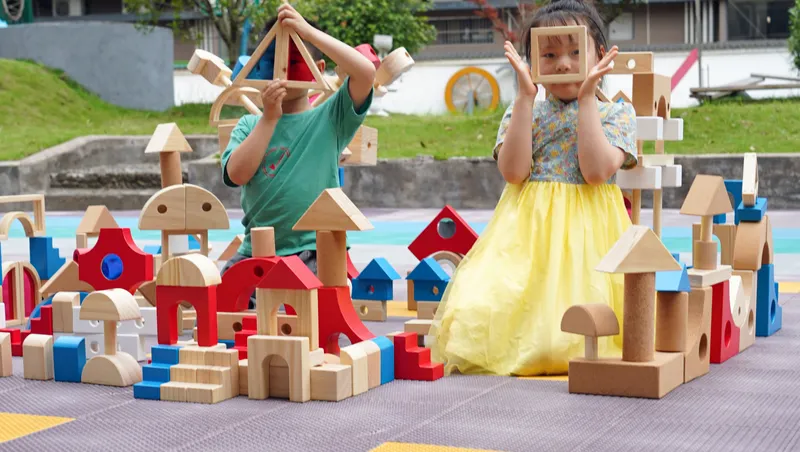
Table of Contents
- Why Block Play Matters for Preschool Development
- Essential Benefits of Building Block Activities
- Block Play Activities for Preschoolers
- Indoor Block Play Activities for Rainy Days
- Wood Block Play Activities for Preschoolers
- DIY Block Play Activities for Preschoolers
- Building Block Activities for Kindergarten
- Math Activities with Blocks
- Dramatic Play Activities Integration
- Block Activities for Infants and Toddlers
Why Block Play Matters for Preschool Development
Research consistently shows that block play promotes problem-solving skills, mathematical thinking, and spatial awareness in young children. According to the National Association for the Education of Young Children (NAEYC), playing with blocks provides opportunities for children to learn elements of science and math while building both gross and fine motor skills.
A groundbreaking eight-year study found that both boys and girls display the most engaged play when handling simple wooden blocks, with researchers noting that blocks promote exceptional problem-solving abilities. The study further revealed a statistical relationship between early block performance during preschool and mathematics achievement through middle and high school levels.
Essential Building Blocks Activity Benefits
The building blocks activity benefits extend across multiple developmental domains:
Cognitive Development
Block activities enhance critical thinking, problem-solving, cooperation, and imagination while helping children develop fine motor skills and learn important math and science concepts. Children naturally experiment with concepts of balance, gravity, symmetry, and spatial relationships.
STEM Skills Foundation
Pattern recognition, symmetry, fractions, and linear measurement are intrinsic parts of block play, while young children practice basic counting and one-to-one correspondence.
Language and Communication
As children engage in block play, they naturally describe their actions, explain their plans, and narrate their play scenarios, enhancing vocabulary, sentence structure, and storytelling skills.
Social-Emotional Growth
Successfully completing block structures gives children a sense of accomplishment and boosts self-esteem, while collaborative play teaches patience, turn-taking, sharing, and teamwork.
Block Play Activities for Preschoolers
These block play activities for preschoolers require minimal materials and maximum imagination:
1. Tower Building Challenge
Give preschoolers a set number of blocks and challenge them to build the tallest tower possible, encouraging problem-solving, fine motor skills, and spatial awareness as children learn about balance, gravity, and stability.
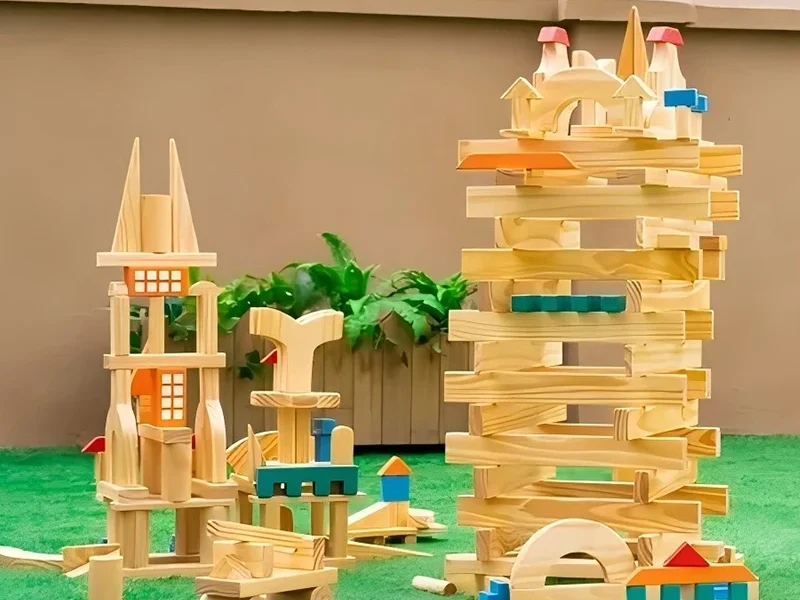
2. Block Maze Construction
Have children create a maze on the floor using blocks, then blow lightweight balls like ping pong balls or pom-poms through the maze using a short, wide straw. This activity enhances spatial planning and fine motor control.
3. Shape Sorting Station
Provide blocks of various shapes and have children sort them into groups, helping with shape recognition, classification skills, and early math concepts.
4. Pattern Replication Game
Create a pattern with blocks and ask your toddler to copy and replicate the same shape you are making. Start with simple AB patterns and progress to more complex sequences.
5. Number Tower Building
Create sheets of paper with numbers 0-9 and have children build corresponding towers—0 blocks on the 0, a 1-block tower on the 1, and so on. This combines counting practice with construction fun.
Indoor Block Play Activities for Preschoolers
These indoor block play activities for preschoolers are perfect for classroom or home settings:
6. Painter’s Tape Block Fill
Use painter’s tape to mark off a square or rectangle on the floor, then let children fill the designated area with blocks, leaving no free space. This teaches spatial awareness and geometry concepts.
7. Block Dice Game
Take turns rolling a die and stacking the same number of blocks on a tower; when all blocks are used, the player with the tallest tower wins.
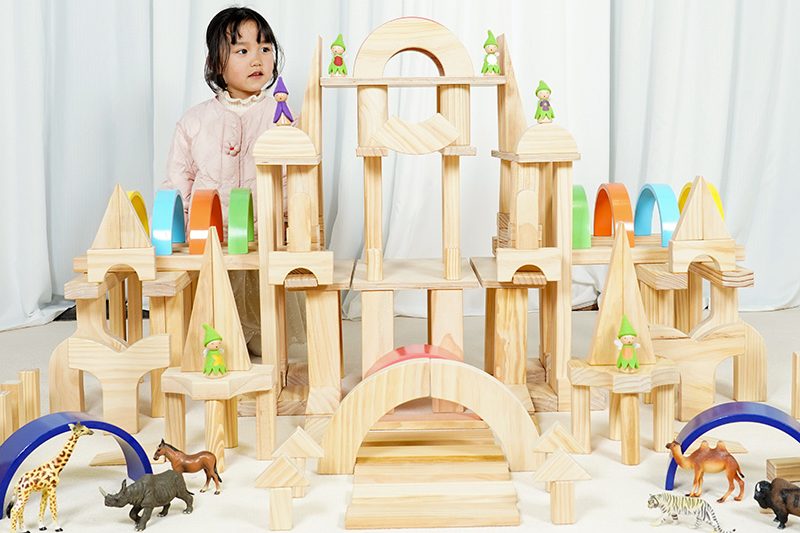
8. Block Road and Bridge Construction
Encourage kids to build roads and bridges for toy cars, integrating block play with imaginative play while enhancing spatial awareness and teaching engineering principles.
9. Animal Habitat Creation
Provide animal figurines and ask preschoolers to build homes or habitats using blocks, fostering creativity, imaginative play, and understanding of animal environments.
10. Color Sorting Activity
Use blocks of different colors and have children sort them into color groups, helping with color recognition, categorization skills, and visual discrimination.
Wood Block Play Activities for Preschoolers
Wood block play activities for preschoolers offer unique advantages due to their natural materials, durability, and sensory qualities:
11. Wooden Block Painting
Give children plain wooden blocks with smooth textures and some paint, asking them to paint the blocks using their creativity and imagination to create their own customized building set.
12. Natural Materials Integration
Add loose parts like natural materials to the construction area—collect items from nature to create unique building experiences that connect children with the environment.
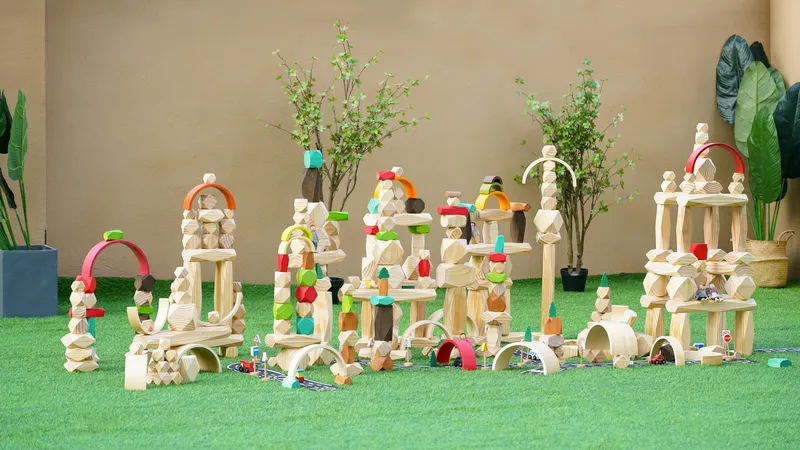
13. Block Stamping Art
Have children dip one side of wooden blocks into paint and dab it on chart paper, continuing with different colors until the paper is filled with colorful block prints.
14. Measuring with Blocks
Give children various blocks and challenge them to build something tall, discussing concepts of height and how different blocks stack together.
DIY Block Play Activities for Preschoolers
These DIY block play activities for preschoolers encourage creativity and resourcefulness:
15. Cardboard Block Creation
Make cardboard blocks quickly using cardboard boxes and packing tape, filling them with packing paper for durability, then covering with contact paper or painting with colorful designs.
16. Homemade Block Set
Grab old materials like egg cartons and small packaging boxes, have children glue paper around boxes and paint each using different colors to create their own handmade blocks.
17. Playdough Block Structures
Along with blocks, provide children with playdough to build unique shapes like trees, trucks, or fish, using clay to stick blocks together.
Building Block Activities for Kindergarten
These building block activities for kindergarten increase complexity for older preschoolers:
18. Architectural Challenge Cards
Create challenge cards that give children specific objects or shapes to build, such as “build a train” or “build a truck,” shuffling cards to make each challenge a surprise.
19. Bridge Building Engineering
Challenge kindergarteners to build simple bridges with building blocks to explore weight distribution and easy engineering concepts, using cardstock or foam board supported by block bases.
20. Block Letters and Name Building
Use building blocks to help kids trace letters with fingers, building letters higher with additional layers to practice letter recognition and formation.
Math Activities for Preschoolers with Blocks
Math activities for preschoolers using blocks make abstract concepts tangible:
21. Counting and Comparing
As children build towers, have them keep track of the number of blocks being added, improving memory and basic math skills.
22. Pattern Creation
Use blocks to copy and create patterns—start with simple AB patterns, then progress to ABB and ABC patterns for preschool children.
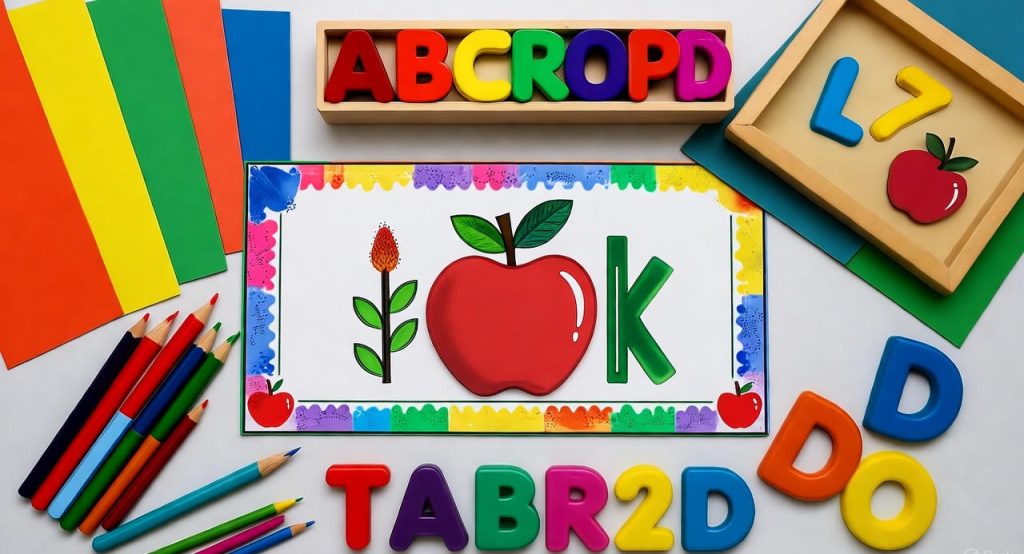
23. Symmetry Exploration
Create symmetrical structures with blocks to introduce the concept of balance and mirror images.
24. Measurement Activities
Kids love using tape measures to predict and check how big they think their creations are.
Dramatic Play Activities Integration
Dramatic play activities for preschoolers combine beautifully with block play:
25. Community Building
Create block towns with recognizable buildings like schools, hospitals, and bakeries, incorporating vehicles, trees, and traffic elements to enhance dramatic play possibilities and storytelling.
26. Pretend Play Scenarios
Children can use blocks as pretend play items, giving blocks names and voices as they act out scenarios, express needs and wants, and practice communication.
Block Activities for Infants and Toddlers
These block activities for infants and toddlers support early development:
For Infants (0-12 months):
Simple dump and fill activities using containers, shaking blocks in small containers, caregiver stacking blocks for baby to knock down, and playing with foam blocks in the bathtub.
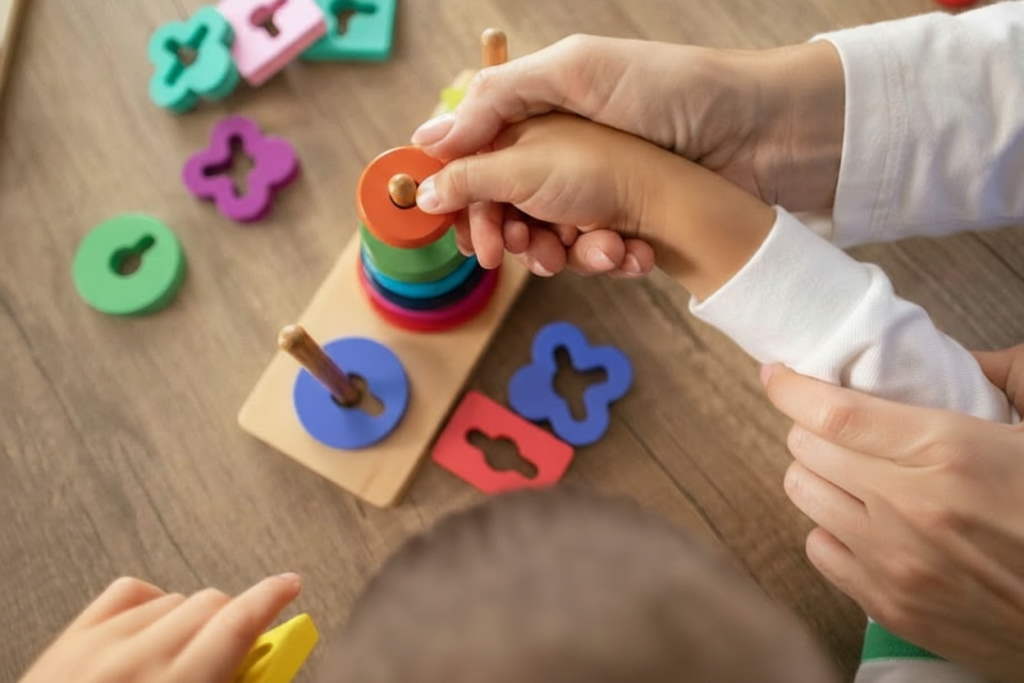
For Toddlers (12-36 months):
Two-year-olds typically build towers of 4 or more blocks, while three-year-olds may build towers of 6 or more blocks. Simple stacking, knocking down, and carrying activities suit this age perfectly.
Creating an Optimal Block Play Environment
Setting up a thoughtfully organized block area with variety and accessibility invites children to create and build while providing safe and stimulating environments for exploration and learning.
Essential Elements:
- Variety of Block Types – Include unit blocks, hollow blocks, foam blocks, and specialty shapes
- Loose Parts – Add natural materials, recycled goods, and household items that children can incorporate into their constructions
- Adequate Space – Ensure enough floor space for collaborative building projects
- Storage Solutions – Labeled baskets and shelves make cleanup easier and encourage independence
- Inspiration Materials – Provide pictures of bridges, block constructions, and other designs for children to try and copy or modify
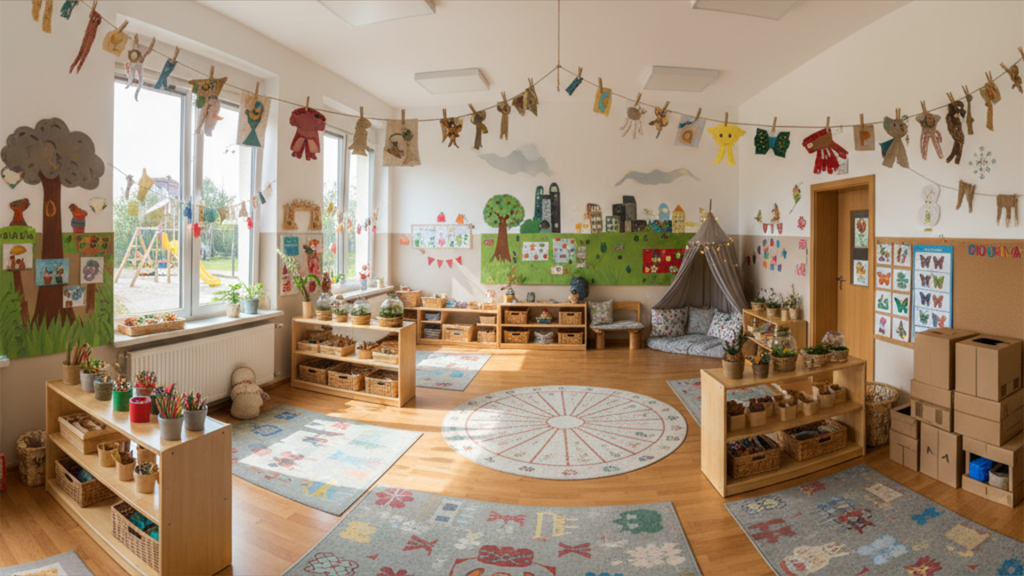
Conclusion
Block play activities for preschoolers represent one of the most powerful tools in early childhood education. From block play activities for preschoolers to sophisticated building block activities for kindergarten, these timeless toys develop STEM skills, creativity, social abilities, and cognitive growth. Whether you choose traditional wood block play activities for preschoolers, create DIY block play activities for preschoolers, or set up indoor block play activities for preschoolers, the building blocks activity benefits are undeniable.
As a manufacturer dedicated to producing high-quality wooden educational toys, we encourage educators and parents to integrate comprehensive block play ideas into daily routines. The investment in quality blocks pays lifelong dividends in children’s development and school readiness.